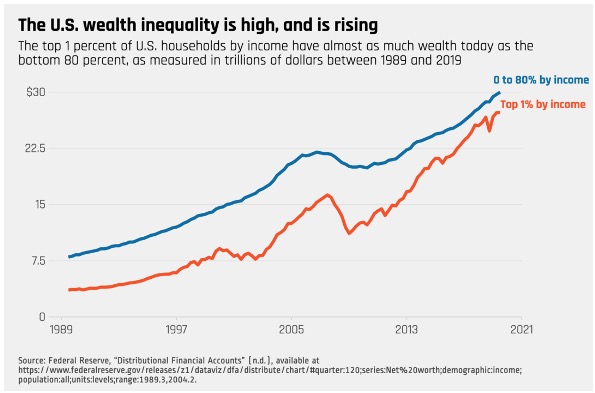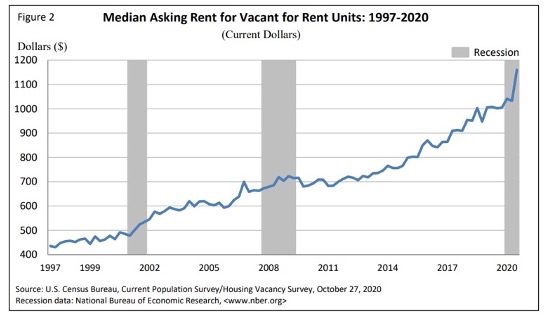CommentsPLANNING WATCH - If you want a job where the barriers to success are daunting, you should consider becoming the Mayor of Los Angeles.
This is what Mayor-elect Karen Bass will confront when she replaces Eric Garcetti in January 2023.
Many of the urban problems she will inherit are beyond the powers of LA’s Mayor. In particular, the charts below explain why the housing crisis is getting worse, and why local elected officials, like Karen Bass, respond with compassionate speeches followed by police sweeps.
First, economic inequality in the United States, including Los Angeles, has steadily increased because of bi-partisan tax and and finance policies. As a result, the top 1 percent of US households now own as much wealth as the bottom 80 percent.

Second, over a similar period the cost of housing has more than doubled when controlled for inflation. The result of these two trends in Los Angeles and elsewhere has been overcrowding and homelessness. More people are priced out of housing, and the forces impacting them are national, not strictly local.

Third, in the same period, spending on public housing has steadily declined. This housing of last resort has slowly disappeared across the entire country, including Los Angeles. The number of public housing units peaked in the early 1990s, and since then has gradually disappeared. This, too, adds economic pressure to tenants, whose housing costs are increasing, whose incomes are stagnant or declining, and who have fewer low-priced housing units to rent.
Karen Bass’s campaign promises: One of Karen Bass’s campaign promises was that her years in Congress would result in more Federal support for LA’s housing crisis. This is unlikely. The Mayor’s political party, the Democrats, at least at the Congressional level, speak with the same voice as their Republican rivals regarding military spending, foreign wars, and housing policy. Overall, the total security spending of the United States is almost $1.4 trillion per year, with annual military expenditures approaching $1 trillion. Congressional and White House foreign policies are bi-partisan, which means that funding for this country’s proxy war against Russia over the Ukraine, will continue. Its cost will soon reach $100 billion, a gargantuan sum that exceeds Russia’s annual military budget of $66 billion, close to that of other European regional powers: the UK, Germany, and France.
With such unwavering commitment to foreign wars and military spending, it is hard to imagine that the next Congress, even with Democrats controlling the Senate and the White House, will do an about-face and properly fund HUD programs to reduce homelessness is American cities. Los Angeles will continue to be on its own.
What about the local causes of LA’s housing crisis? Los Angeles voters approved Measure ULA by a 57 percent margin, without the support of Karen Bass and Rick Caruso. As a major commercial and residential landlord, Rick Caruso’s opposition to an increased transaction tax on properties selling for more than $5,000,000 is understandable, while Karen Bass’s silence is harder to explain, especially since a major funder of Measure ULA, the LA County Federation of Labor, also strongly supported Karen Bass. My guess is that the main opposition to Measure ULA, the landlord lobby, persuaded Karen Bass silence on the measure, even though its passage strengthens her hand on housing issues.
But Measure ULA is hardly a cure-all. Its projected revenue stream of $600 million to $1.1 billion per year for tenant assistance and low income housing construction, still leaves the macro causes in homelessness in place. Measure ULA does not:
- Reduce economic inequality in the United States, including Los Angeles.
- Increase wage rates so more Angelenos can afford vacant housing.
- Restore terminated public housing programs.
It also does not eradicate the local causes of homelessness:
- LA’s Rent Stabilization Ordinance (RSO) is weak, and none of Measure ULA’s provisions address this. 1978, not 1995, remains the base year for low income housing that the RSO protects. Furthermore, other anemic RSO provisions, especially vacancy decontrol, remain in place.
- LA’s Density Bonus ordinances, SB 1818 and TOC Guidelines, remain in force. They provide easy, often ministerial, work-arounds for developers whose projects cannot be legally built without zoning waivers.
- There are no enforcement or monitoring programs to verify developers’ density bonus pledges to build low income housing units for vetted low income tenants.
- LA’s new Housing Element will up-zone tens of thousands parcels based on the dubious claim that existing zoning laws stymie housing production. Likewise, the City Council will soon adopt the Downtown Community Plan, a template for form-based zoning and 26 additional land use ordinances to be rolled out citywide through long-stalled Community Plan updates.
- There is no evidence that LA’s current building boom of expensive rental housing reduces the cost of existing housing. Not only is some of this housing demolished to make way for the new high-rise buildings, but the new apartment buildings’ high rents lift the cost of existing housing.
- While rising interest rates may hinder corporate buyers of houses and apartments, their relentless search for profits in LA’s real estate markets remains a powerful force to raise housing costs.
- Ordinances and laws that restrict residential evictions expire in January 2023. These changes will increase homelessness, even if the LAPD further clamps down on homeless encampments, per the new mayor's housing proposals.
With so many local barriers in place, it will take more than Karen Bass’s infectious enthusiasm and Washington connections to placate LA’s fed-up residents. When it comes to homelessness, they see consequences, not causes. They complain to elected officials, like her, whose ultimate recourse is more sweeps of homeless encampments. Instead, to substantially reduce homelessness, LA’s new Mayor must take on the national Democratic Party, as well as her City Hall colleagues. The leopard does not change its spots, and the chance that Karen Bass will do this is not great.
As for other problems that burden Los Angeles, Karen Bass has inherited a mess. City Hall barely does anything to mitigate climate change. As for the city’s infrastructure, the official plans are a half century old, which helps explain why the city’s urban forest is shrinking, its sidewalks and streets are decrepit, mandatory ADA curb cuts are hit and miss, parks are minimal, frequent black outs plague the electric grid, and water mains often burst. Finally, traffic congestion is getting steadily worse, a function of City Hall land use practices that encourage up-scale, auto-centric McMansions and apartment buildings. As for mass transit, the system is expanding but is missing two key features: Kansas City style free fares and essential first-last mile improvements, like parking lots and pedestrian access ways to stations.
Good luck, Karen Bass, since you will need lots of it.
Dick Platkin is a former Los Angeles city planner who reports on local planning issues for CityWatchLA. He serves on the board of United Neighborhoods for Los Angeles (UN4LA). Previous Planning Watch columns are available at the CityWatchLA archives. Please send comments and corrections to [email protected] .
















